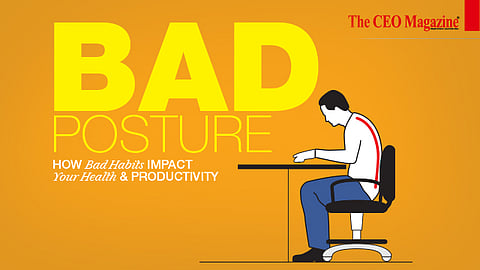
- News
- Women
- Magazine
- IndustryIndustry
- InsightsInsights
- Success Stories
- PublishPublish
- ContactContact
- Media KitMedia Kit

Bad Posture: How Bad Habits Impact Your Health and Productivity
Bad Posture: How Bad Habits Impact Your Health and Productivity
Prolonged sitting is a major cause of bad posture. When we spend extended periods sitting, whether at office jobs, during long car rides, or while using screens for extended periods, we often slouch and put our spines in unnatural positions.
Many workplaces lack ergonomic setups. Chairs, desks, and computer screens are not tailored to each individual’s needs, forcing people into awkward positions. This discomfort can lead to poor posture over time.
The widespread use of smart-phones and tablets has led to a phenomenon known as “tech neck.” Constantly bending over these devices strains the neck and shoulders, causing individuals to develop bad posture habits.
High levels of stress can lead to tension in the neck and shoulders, causing individuals to hunch over. This tension can become chronic, reinforcing bad posture habits. Additionally, feeling down or lacking confidence can manifest physically as poor posture, with individuals slouching or rounding their shoulders.
Bad posture doesn’t just affect physical health; it can have wide-ranging consequences on our emotional well-being, sleep quality, and overall productivity.
Bad posture can gradually change the natural shape of our spine over time. This altered alignment puts extra pressure on the wrong parts of our spine, making it less capable of handling shocks and stress. Eventually, this can lead to serious spinal injuries and chronic discomfort.
Poor posture often results in muscle pain and discomfort. Slouching, whether in a seated or standing position, places added strain on our upper and lower back muscles. This constant tension can lead to backaches, neck pain, and even headaches.
Bad posture restricts the ability of our lungs to expand fully. As a result, we tend to breathe more shallowly, which reduces our intake of oxygen. This shallow breathing can lead to feelings of tiredness, decreased cognitive function, and difficulty concentrating.
Bad posture can have an emotional impact as well. When we slouch or hunch, we often project an image of insecurity and lack of confidence. This can affect our self-esteem and how others perceive us, potentially hindering career advancement and personal relationships.
Poor posture can cause muscle tension and discomfort, making it challenging to achieve restful sleep. As a result, individuals with bad posture may toss and turn at night in search of a comfortable sleeping position, leading to disrupted sleep patterns and reduced overall sleep quality.
Sitting with bad posture can compress abdominal organs, hindering the digestive process. This compression can lead to digestive discomfort and issues such as acid reflux, as the normal functioning of the digestive system is compromised.
Bad posture can negatively impact motivation and productivity at work. When individuals are constantly dealing with discomfort due to their posture, their focus may shift from the tasks at hand to feeling uncomfortable. This can lead to decreased motivation and hinder productivity. Additionally, bad posture is linked to low self-esteem, which can further reduce motivation.
Make your work area more comfortable and ergonomic. Invest in chairs, desks, and monitor stands that support good posture. Adjust these items to fit your body so you can sit and stand up properly. This means your feet should be flat on the floor, your knees at a 90-degree angle, and your computer screen at eye level.
Regularly stand up, stretch, and move around during your workday. Consider using a standing desk or sitting on a large exercise ball as a chair, which can help improve your posture by engaging your core muscles and preventing slouching.
Incorporate exercises and stretches into your daily routine that strengthen the muscles responsible for good posture. Engaging in activities like yoga, Pilates, and strength training can help build a stronger core and back, which supports better posture.
High stress levels can contribute to poor posture. Practice relaxation techniques such as deep breathing, meditation, or mindfulness to reduce tension in your neck and shoulders, making it easier to maintain good posture.
If you experience chronic pain or have difficulty improving your posture on your own, consider seeking assistance from a healthcare professional. Physical therapists, chiropractors, and posture specialists can provide personalised exercises and adjustments to address your specific posture issues and alleviate pain.
Bad posture is a growing issue among working people, and it can harm our health and productivity. We all need to take steps to fix this problem. By creating better workspaces, taking care of our bodies and minds, and seeking help when needed, we can fight the silent epidemic of bad posture and make work better for everyone. Remember, good posture isn't just about staying healthy; it's about creating a better and more productive workplace.
Follow us on Google News
